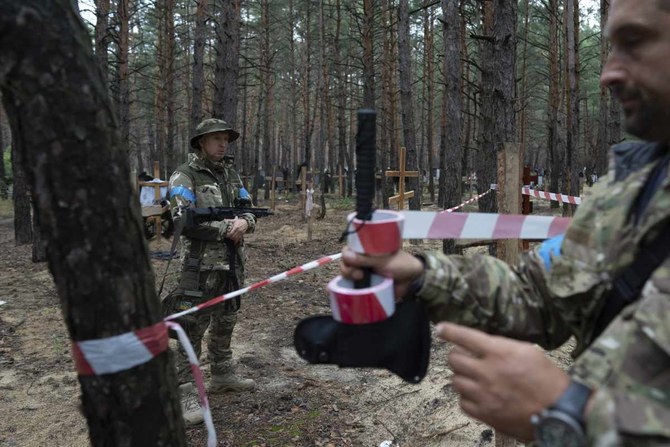KYIV: Ukrainian authorities found a mass grave of more than 440 bodies in the northeastern town of Izium that was recaptured from Russian forces days ago, a regional police official said, adding some of the people had been killed by shelling and air strikes.
Thousands of Russian troops fled Izium last weekend after occupying the city and using it as a logistics hub in the Kharkiv region. They left behind large amounts of ammunition and equipment.
“I can say it is one of the largest burial sites in a big town in liberated (areas)... 440 bodies were buried in one place,” Serhiy Bolvinov, the chief police investigator for Kharkiv region, told Sky News. “Some died because of artillery fire ... some died because of air strikes.”
Reuters could not immediately verify the Ukrainian claim and there was no immediate public comment from Russia on the allegation.
President Volodymyr Zelensky, who had paid a surprise visit to Izium on Wednesday to greet Ukrainian troops, put the blame on Russia and likened the discovery to what happened in Bucha, on the outskirts of the capital Kyiv in the early stages of the late February invasion by Russian forces.
Ukraine and its Western allies have accused Russian forces of perpetrating war crimes there. Tens of thousands of civilians were likely killed in a separate Russian assault on the southern port of Mariupol, Ukrainian officials said in April.
“Russia is leaving death behind it everywhere and must be held responsible,” Zelensky said in a video address late on Thursday.
Russia has denied targeting civilians or committing war crimes.
Fortifying
After a week of rapid Ukrainian gains in the northeast, Ukrainian officials said Russian forces were fortifying defenses and it would be hard to maintain the pace of the advance.
Russian President Vladimir Putin has yet to comment publicly on the setback suffered by his forces this month. Ukrainian officials say 9,000 sq km (3,400 sq miles) has been retaken, territory about the size of the island of Cyprus.
Footage shot by Reuters on Thursday in the eastern town of Kupiansk, which Ukrainian forces recaptured last week, showed many buildings had been damaged or burned out.
“No electricity, no communications ... if there were communications we could least talk to family. If only there hadn’t been all this bombing with everyone in their basements,” said one man.
The speed of the advance has lifted hopes of further gains before the winter sets in.
But Serhiy Gaidai, governor of Ukraine’s eastern Luhansk region, said it would still be a tough fight to wrest control of his region back from Russia, which recognizes it as an independent state controlled by separatists.
There was no let-up either in Russia’s daily missile strikes on Thursday, a day after it fired cruise missiles at a reservoir dam near Kryvyi Rih, Zelensky’s hometown in central Ukraine.
Authorities in Kryvyi Rih are working to repair the damage and as a result water levels are receding, said Kyrylo Tymoshenko, deputy head of the presidential administration.
Ukrainian forces repelled three Russian attacks north of the city of Donetsk, the armed forces’ general staff said in a Facebook post.
Russian forces had launched attacks on several settlements on the Kharkiv frontline in the past 24 hours, the General Staff of Ukraine’s Armed Forces said.
Reuters was not able to verify battlefield reports.
China's concern about Ukraine
Russia’s Putin said on Thursday he understood China’s leader Xi Jinping had concerns about the crisis in Ukraine, a surprise acknowledgement of friction with Beijing over the war.
Since Russia invaded Ukraine, China has trod a careful line, criticizing Western sanctions against Moscow but stopping short of endorsing or assisting in the military campaign.
“We highly value the balanced position of our Chinese friends when it comes to the Ukraine crisis,” Putin told Xi in Uzbekistan at their first meeting since the war began.
“We understand your questions and concern about this. During today’s meeting, we will of course explain our position.”
Xi did not mention Ukraine in his public remarks, nor was it mentioned in a Chinese account of the meeting.
Russian Foreign Minister Sergei Lavrov later told reporters the talks with China had been excellent.
The last time Putin and Xi met they signed a “no limits” friendship agreement between their countries. Three weeks later, Russia invaded Ukraine in what it called a “special military operation” to “disarm” its smaller neighbor.
Ukraine and the West accuse Russia of an unprovoked war of aggression. Pope Francis said it was morally legitimate for nations to supply weapons to Ukraine to help the country defend itself from Russian aggression.
“This is a political decision which it can be moral, morally acceptable, if it is done under conditions of morality,” Francis said in an airborne news conference while traveling from a trip to Kazakhstan.
Francis also urged the Kyiv government to be open to eventual dialogue, even though it may “smell” because it would be difficult for the Ukrainian side.
In Washington, US officials said the United States will soon announce a new $600 million weapons package for Ukraine’s military.
















